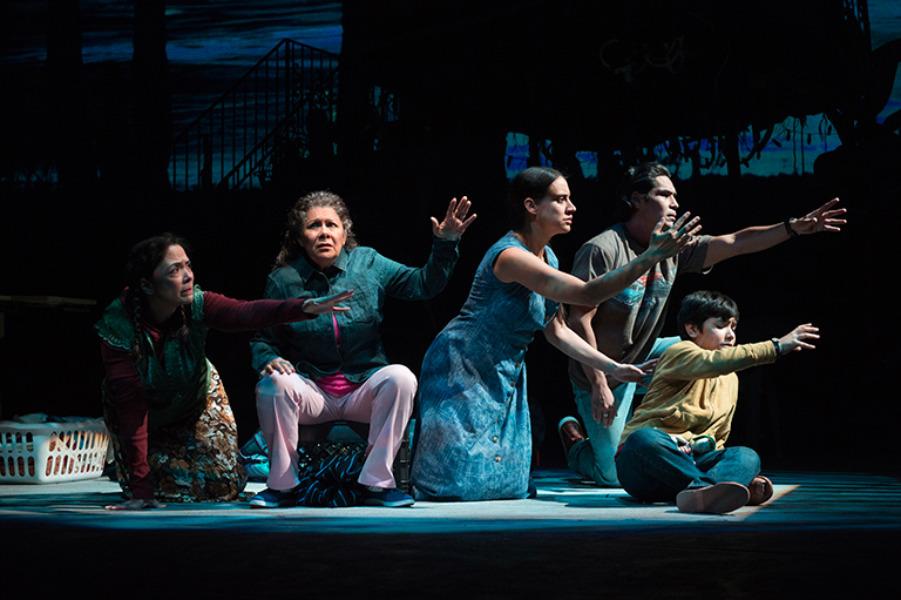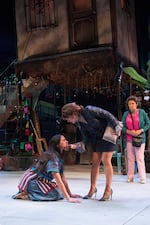
Nancy Rodriguez (Josefina), VIVIS (Tita), Sabina Zuniga Varela (Medea), Lakin Valdez (Jason) and Jahnangel Jimenez (Acan).
Jenny Graham / Courtesy of Oregon Shakespeare Festival
Perhaps the hottest ticket at the Oregon Shakespeare Festival this spring is a show with a 2,000-year-old story: "Mojada: A Medea in Los Angeles" by OSF's resident playwright, Luis Alfaro. He's a recipient of MacArthur and Mellon fellowships, among other honors.
The play, directed by Juliette Carrillo, retells Euripides’ classic tale of a princess who’s followed her lover into exile in a foreign land. When he rejects her, she kills her own children in an act of vengeance.
You may think you know this classic. But Alfaro’s adaptation elicits gasps of shock at every performance.
Sabina Zuniga Varela is the New Mexican actress who’s put an imprint on the role over three productions, in Chicago, Los Angeles, and now in Ashland, Oregon. (She’ll return to Oregon this fall as Portland Center Stage hosts its own production of the show.)

Sabina Zuniga Varela: "Everybody keeps telling Medea, 'You need to understand how it works here. You have to dress like them, talk like them. This is what we do here.' All Medea can say is, 'I don’t understand.'"
Richard Wright / Courtesy of Sabina Zuniga Varela
“Medea is one of the most challenging and intriguing characters to explore,” Varela said. “Is what she does unforgivable? What if we find out why she did what she did?"
“Mojada” marks the third time Alfaro has adapted a classic Greek drama, having previously explored characters like Oedipus and Electra.
He started thinking about Medea, the princess of Colchis around 2011. He’d written an early version of the play for San Francisco’s Magic Theater, focused on Medea’s mystical identity as a sorceress. In Chicago, for a subsequent production, Alfaro found himself considering Medea’s identity as an outsider to Greek society.
Classical scholars identify her as a noblewoman from Colchis, a coastal kingdom on the shores of the Black Sea, where the present day country of Georgia now lies. Colchis had a contentious relationship with several city-states in ancient Greece.
“Somebody turned me onto a YouTube clip of Dame Judith Anderson, in the 1940s-1950s, playing Medea. And it’s very, ‘Woe is me!’ One of those Medeas," Alfaro said. "And in it, the women of Corinth circle her and say, 'Look at her, soiling our shore.' And I thought 'Ohhhhh, she’s an undocumented woman who’s arrived in this land and everybody hates her!'"
He decided to convert the story into a tale of Mexican immigrants trying to make it in Los Angeles.
“Mojada” begins with a monologue by Medea’s nurse and surrogate mother, Tita, played by the actress VIVIS. She softens up the crowd with jokes and stories about the family’s new life in America. But each joke is delivered with the understanding the transition was a rough one.
At one point in her monologue, the audience has barely recovered from Tita’s analogy of a big strong guy from the neighborhood as a bull between the sheets.
“They hide their 'chisme' here,” Tita continues, amid the audiences hoots and laughter, “because somebody always wants to steal your secrets! Your smile! Your bull! Which is why it’s better in this country to have nothing, which is exactly what I have.”
Through three productions, Alfaro’s vision of the play has changed. As he fleshed out Medea’s immigrant experience, he came to focus on her isolation and past traumas.
“More than half all women who cross into the U.S., undocumented from the southern border are assaulted, sexually,” Alfaro said, “most of the time on other side of the border, a great deal of the time by the Mexican Army. So by the time you get here, there’s already a trauma you’re carrying with you.”

Playwright Luis Alfaro: "I came into playwriting as a means of creating social change."
Jenny Graham / Courtesy of Oregon Shakespeare Festival
In a pivotal scene in “Mojada,” Jason comes home from his construction job. He and Medea are alone in the dusty yard by the tumble-down shack where they live. Medea makes an impulsive pass at Jason. She knows they’re drifting apart, and is trying to break through a horror of intimacy that followed her north from the border.
“I don’t want it to feel like a prison,” she tells Jason. “I want to love in this yard, make it a special place for us. Like before.”
But in the end, she can’t do it.
The price exacted at the border crossing is just the beginning. As the play unfolds, it becomes clear Medea is unable to forget her past, learn English, and hustle within the very limited avenues open to Mexican immigrants. She spends her days sewing collars and cuffs for sweatshop wages, seldom going out, a prisoner of her own anxieties. That inability to conform to an American ideal drives her to tragedy.
Actress Sabina Zuniga Varela says she’s felt the heart of the play shifting.
“It’s speaking to the world in a way that I hadn’t felt the weight of quite as fully as I do with this run,” Varela said. “Zeroing in on this immigration story and what assimilation can do to a family, it’s becoming clearer and clearer.”
In Euripides’ original, King Creon convinces Jason to marry his daughter, Glauce, and abandon Medea. For “Mojada,” Alfaro jettisoned Creon and sharpened the love triangle. In Creon’s place, he created Armida, Jason’s boss — a brassy, glamorous construction executive, born in Medea and Jason’s home town. At first she seems poised to help the family, she sets her eye on things money can’t buy, and moves to take Medea’s place within the family.
In a harrowing scene, Armida scornfully suggests Medea’s son and lover will be far better off with Medea out of the picture.
Armida: I want you out.
Medea: Please.
Armida: Don't do this to yourself, Medea.
Medea: I am begging you.
Armida: Look at me! We don't need your shame. I can give him what he wants.
Medea: I beg — like a dog.
Armida: Don't beg! It's pathetic!
Medea: I am pathetic. I am a wetback. Una mojada.
By the end of the play, Medea feels there is no exit in sight.
Alfaro said it wasn’t easy creating a figure who rejects the corruption of the world, and then backing her into a desperate corner.

Sabina Zuniga Varela, as Medea (left) and Vilam Silva, as Armida (center), as VIVIS (Tita) looks on.
Jenny Graham / Courtesy of Oregon Shakespeare Festival
But he feels the demands placed on Medea tell an essential truth about the sacrifice America demands of its immigrants.
“I’m American born,” Alfaro said. “My mother was here before the border. My father was from southern Mexico — where [Medea and Jason’s story] takes place. We had a pretty brutal journey as a young American family. I see it through the very forgiving lens of my father. He sees in us, definitely, progress. But I’m not sure he ever saw the glass half full.”
Alfaro said, judging from the lives of his students at USC, he’s not convinced the journey is getting any easier.
“Mojada: A Medea in Los Angeles” runs at the Oregon Shakespeare Festival in Ashland through July 6. An additional production comes to Portland Center Stage in November.

